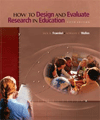Jack R. Fraenkel,
San Francisco State University
Norman E. Wallen,
San Francisco State University
| Background (or demographic) question | Question asked by an interviewer or on a questionnaire to obtain information about a respondent's background (age, occupation, etc.).
|
 |
 |
 |
| Experience (or behavior) question | Question a researcher asks to find out what sorts of things an individual is doing or has done.
|
 |
 |
 |
| External audit | An individual outside the study is asked to review the methods and interpretations of a qualitative study.
|
 |
 |
 |
| Feelings question | Question researchers ask to find out how people feel about things.
|
 |
 |
 |
| Informal interview | Less-structured form of interview, usually conducted by qualitative researchers. They do not involve any specific type or sequence of questioning, but resemble more the give and take of a casual conversation.
|
 |
 |
 |
| Knowledge question | Questions interviewers ask to find out what factual information a respondent possesses about a particular topic.
|
 |
 |
 |
| Member checking | Participants in a qualitative study are asked to check the accuracy of the research report.
|
 |
 |
 |
| Naturalistic observation | Observation in which the observer controls or manipulates nothing, and tries not to affect the observed situation in any way.
|
 |
 |
 |
| Nonparticipant observation | Observation in which the observer is not directly involved in the situation to be observed
|
 |
 |
 |
| Observer bias | The possibility that an observer does not observe objectively and accurately, thus producing invalid observations and a threat to the internal validity of a study.
|
 |
 |
 |
| Observer effect | The impact of an observer's presence on the behavior observed
|
 |
 |
 |
| Observer expectations | The effect that an observer's prior information can have on observational data.
|
 |
 |
 |
| Open-ended question | A question giving the responder complete freedom of response.
|
 |
 |
 |
| Participant observation | Observation in which the observer actually becomes a participant in the situation to be observed.
|
 |
 |
 |
| Retrospective interview | A form of interview in which the researcher tries to get a respondent to reconstruct past experiences.
|
 |
 |
 |
| Semi-structured interview | a structured interview, combined with open-ended questions.
|
 |
 |
 |
| Sensory question | Question asked by a researcher to find out what a person has seen, heard, or experienced through his or her senses.
|
 |
 |
 |
| Simulation | Research in which an "artificial" situation is created and participants are told what activities they are to engage in.
|
 |
 |
 |
| Structured interview | A formal type of interview, in which the researcher asks, in order, a set of predetermined questions.
|
 |
 |
 |
| Triangulation | Cross-checking of data using multiple data sources or multiple data-collection procedures.
|



 2003 McGraw-Hill Higher Education
2003 McGraw-Hill Higher Education